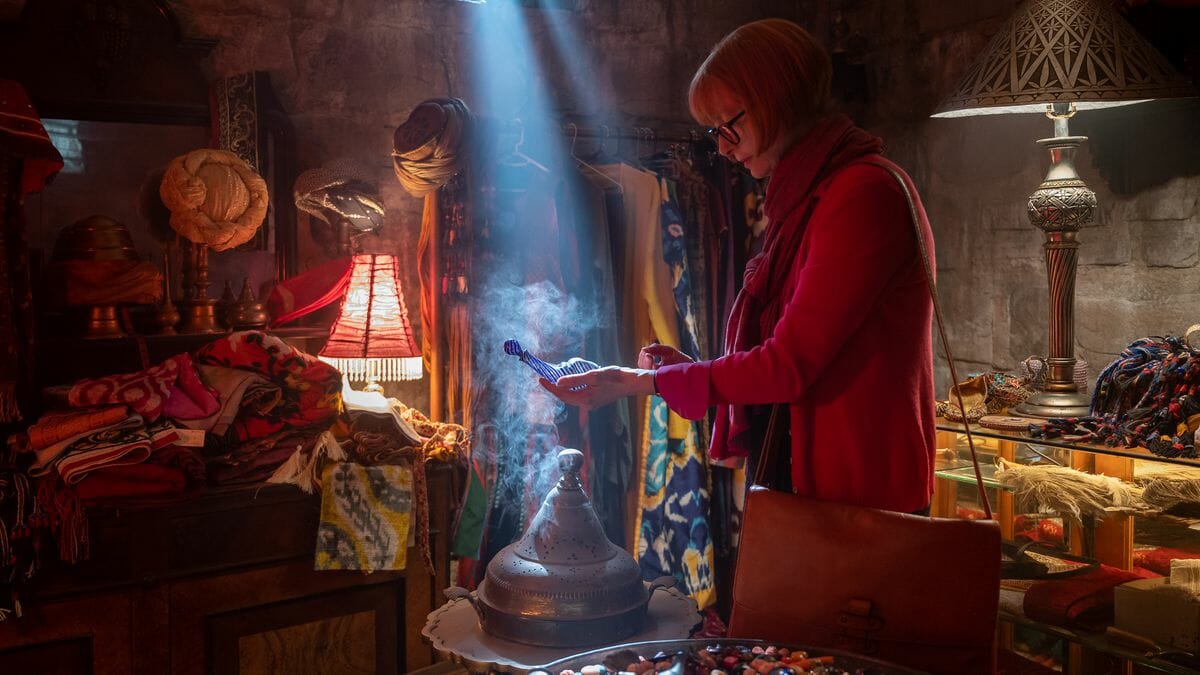George Miller’s Three Thousand Years of Longing is unlike anything he’s done before, which is in and of itself a feat—the man’s directed everything from Mad Max to Babe: Pig in the City. His imagination is intrepid. Longing, co-adapted with his daughter Augustus Gore, makes good use of his mind’s eye, spanning millennia of mythology to unspool the love between a woman and a djinn. His trademark visual splendor is everywhere to behold. And so is something new to the Miller oeuvre: a calm, laid-back pace.
Fury Road was a high-speed chase on acid and fire; Longing is a book tucked away in the quiet corner of the library. Fury Road opens with a snarl— “My name is Max. My world is fire and blood.”—but Longing, in contrasting parallel, opens in a low, even tone: “My name is Alithea. My story is true.” Alithea, a narratologist in Istanbul for a conference, accidentally takes her work home (or to her hotel room, rather) when she buys a bottle with a djinn trapped inside. Alithea frees the djinn after rubbing the bottle for non-magical reasons, as one does, and the djinn, as they do, offers to grant her three wishes. Alithea is skeptical—she knows the stories of trickster djinn and suspects the monkey’s paw will curl—but the djinn, insistent on his innocence, is open to sharing his history and motives, so the two get to talking.
READ ALSO: Read all of Ryan Bordow’s movie reviews here
Miller and co. keep the tête-à-tête visually striking despite the unadorned hotel room. The first we see of the djinn is a humongous foot blocking the bathroom doorway, an image as respectably weird as your average Fury Road shot. The visual effects are humble but effective. The real meat, though, comes in the djinn’s stories, which take up the bulk of the film. In describing his imprisonments across the ages, the djinn whisks us across the Middle East from the age of King Solomon to the Ottoman Empire and beyond. The journey is visually sumptuous. Far from the desaturated browns and greys that American movies slather on the Middle East, Longing is bursting with color and character. Violet sunsets and inky night skies, deep blood-red garments and bright scarlet fabrics, crystal blue waters and explosive orange fire, all saturating into memory like watercolor on parchment. In an era of lazy, samey color grading, it’s a feast among meager meals. It’s refreshing to see Black skin lit properly as well. And oh, the production design—gorgeous, intricate costumes and sets curated by Roger Ford, the Babe designer who’s circled back to Miller for a more ambitious vision. To the eyes, Longing is perfect.
The mind and heart may not be so sated. The pace of the storytelling is very much a coast, comfortable and breezy but without space for tension. The stories’ players have their conflicts—usually involving romance or power—but these figures, usually historical, remain caricatures, actors embodying textbook descriptions. This is mostly fine; the film explores how stories reflect, shape, and are life; the figures within the djinn’s stories aren’t the thematic foreground. But floating through their tales can rob key moments of impact. One of Longing’s most evocative shots—the bloodthirsty Sultan Murad IV sitting before his own throne, enraptured by the storyteller in his seat of power—is diluted by context that feels like fluff in the grand scheme of things.

More deflating is the underdeveloped framing story of Alithea and the djinn. It’s presented as yet another story in that grand scheme, which is tonally fitting but leaves it somewhat weightless. It doesn’t help that the blossoming romance at its core is dispiritingly unconvincing. Tilda Swinton and Idris Elba, two consummate actors, fail to summon any real chemistry. Whether it’s a casting or a script problem is hard to tell—their scenes just feel muted. Even in the third act, when the djinn’s stories are over and Alithea’s takes precedence, their connection feels merely conceptual. It’s at this point that Longing fizzles out with a half-baked condemnation of prejudice, sidestepping the specter of the “Magical Negro” trope for a reminder that racism is, if you’d believe it, bad. Fables needn’t be so tepid.
Still, before it loses steam, Three Thousand Years of Longing moves and looks like a dream, capturing the cozy timelessness of tales that endure for a reason. Miller’s foray into tranquility is not a regrettable one—it’s just enough to capture our interest, if not our imagination.
★★★ (3/5)




